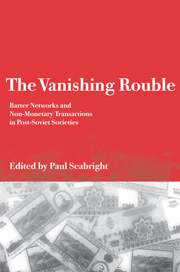Book contents
- Frontmatter
- Contents
- List of figures
- List of tables
- List of boxes
- Preface
- List of contributors
- Introduction: barter networks and ‘information islands’
- I Theory
- 1 Some lasting thing: barter and the value of money
- 2 Barter relationships
- 3 An anthropological view of barter in Russia
- II Large-scale empirical studies
- III Ethnography
- Conclusion: what is to be done?
- Index
1 - Some lasting thing: barter and the value of money
Published online by Cambridge University Press: 05 May 2010
- Frontmatter
- Contents
- List of figures
- List of tables
- List of boxes
- Preface
- List of contributors
- Introduction: barter networks and ‘information islands’
- I Theory
- 1 Some lasting thing: barter and the value of money
- 2 Barter relationships
- 3 An anthropological view of barter in Russia
- II Large-scale empirical studies
- III Ethnography
- Conclusion: what is to be done?
- Index
Summary
And thus came in the use of Money, some lasting thing that Men might keep without spoiling, and that by mutual consent Men would take in exchange for the truly useful, but perishable Supports of Life.
(John Locke, The Second Treatise on Government, Section 47)Introduction
Much of the work reported in this volume reflects interest in the growing phenomenon of trading in barter, often multilateral barter, in Russia in the 1990s. To monetary theorists, the timing is more than a little ironic. In the same decade, we have seen an explosion of theoretical research on the emergence of money as a medium of exchange. Among other pre- dictions, this theory suggests that a transition from barter to money is likely to be self-fulfilling, because a medium of exchange is all the more desirable if many others accept it; the process can be hastened by making money legal tender; its universal acceptability is then common knowledge among all participants in economic activity. Money is more efficient in exchange than barter, because it mediates possible failures of the double coincidence of wants; it follows, from this, that monetisation is an important component of the transition to a modern capitalist system. It is likely to happen of itself; the legalisation of money helps smooth the transition.
All of this makes perfect sense: it is unfortunate, then, that facts contradict such a reasonable theory. Russia, since 1989, has often been viewed as part of a great economic experiment of transition to modern capitalism.
- Type
- Chapter
- Information
- The Vanishing RoubleBarter Networks and Non-Monetary Transactions in Post-Soviet Societies, pp. 15 - 34Publisher: Cambridge University PressPrint publication year: 2000
- 3
- Cited by



